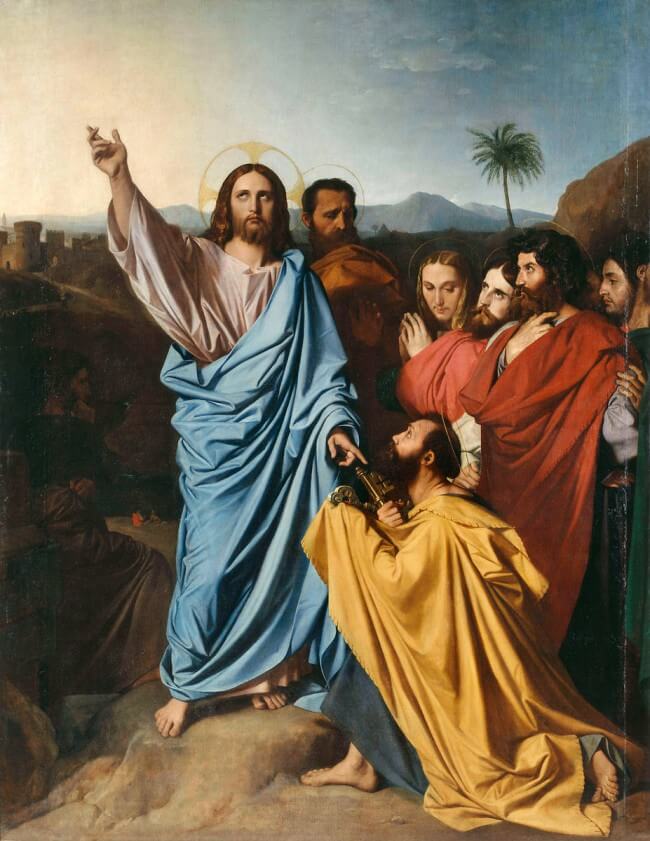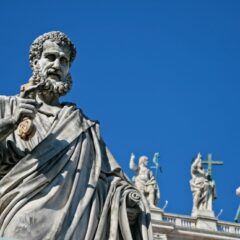Peter
The Church: Divine And Human

21st Sunday In Ordinary Time
Fr. Mark Gatto
Preached: August 23, 2020
The Church is both divine and human. It is rooted in the mystery of Jesus. Rooted in that profession of faith expressed by Peter, “you are the Christ, the Son of the Living God.” Jesus is the heart of the Church and it is Jesus that allows us to say the Church is Holy.
But the Church is also very human, it has a human institution and structure. It exists within history and time. It is influenced and changed as our human society changes. Jesus calls Peter and says in Matthew’s Gospel, “on this rock I will build my church.” Peter was a weak, sinful human being that we all can relate to. Peter often misunderstood Jesus, he fell asleep in Gethsemane, he betrayed Jesus at his crucifixion. Yet, this is the rock Jesus chose to build his church. God chooses to work through human beings and only with our cooperation.
In the Nicene Creed we speak of the four marks of the church. The Church is one, holy, catholic and apostolic. We see the Pope, the Bishop of Rome, as the successor of Peter. The Popes throughout history have had weaknesses and failings like all of us. Yet, this is the rock upon which Jesus chooses to build his church. The Pope is a sign of that unity, the oneness, that is a mark of the Church. We are one throughout the ages, with the Saints of different times, with Catholics in each generation. We are one throughout the world, with Catholics in every country and culture. The connection with the Pope as the successor of Peter is the visible sign of our unity, the rock which makes the Church one and catholic.
If you have ever been in Rome to a Papal Audience or gathering for the Sunday Angelus with the Pope, the oneness, the unity of the church is visibly seen. People from every continent on earth gathered together, united in a common faith in Jesus, the Son of the Living God, and connected together with the Pope as successor of Peter.
Jesus declares that “the gates of Hades will not prevail against it.” Throughout history the Church has faced persecution, faced opposition, faced internal divisions. The Pope as successor of Peter remains as a rock despite even the failings of some Popes. During this Covid, so many different opinions, divisions between people, different ways of seeing things became so visible, especially on social media. It is more important than ever that we remain connected to the Pope, the successor of Peter.
The unity of the Church, the Church as one, that we express in the Creed depends on this remaining connected to the Pope. Each time our parish celebrates the Eucharist, we express that unity and connection to the Pope during the Eucharistic Prayer when the priest prays, “together with Francis our Pope.” We are expressing that our local community is in communion with the universal Catholic Church throughout the world and throughout time. All of us united in that common faith expressed by Peter, “you are the Christ, the Son of the living God.”
The Church is divine and human. Our common faith in Jesus expressed by Peter expresses the source of the holiness of the Church, Jesus, the Son of the living God. Today, through the Pope as successor of Peter we remain on that rock upon which Jesus built his Church. It is made up of weak sinful human beings like us. But, remaining united, visibly connected to the Pope as successor of Peter, allows the Church to remain one. In the heart of this one Church is Jesus, the Son of the living God.
Who Do You Say That I Am

21st Sunday In Ordinary Time
Deacon Robin Mendonca
Preached: August 23, 2020
Introduction
If you were asked, “Who are you?” how would you answer? Chances are you might respond by saying that you are a mother, or a father, a son, daughter or a friend, a granddaughter or someone thing like that. You would probably notice your response would be an answer that shows you are in relationship with others. And chances are, those who are you closest friends know who you are and how the relationships in your family work. In a sense we could probably say that those who are closest to you know about your closest relationships as well.
Jesus wants to see if those closes to him know who he is
This is what’s happening in the Gospel today. Jesus is trying to see if those closest to him know who he is. Jesus seems not as concerned YET that all the other people in Israel who he ministered to are not entirely know who he is and might be a bit confused about it all but he is expecting that those with whom he lives with and travels with, those who have become his best friends would at least know who he is. I think we all have this deep desire to be known and to be in relationship with others and that is Jesus’s desire as well; to be known by those who are close to him. And that’s the question that is asked to us today: “Who do you say that I am?” It’s a very important question and in some ways our entire spiritual lives can depend on it.
Out of Peter’s declaration comes his Identity
Because on one hand we can say what the Israelites were saying: that Jesus was a good and holy man who did a lot of marvelous things, who worked wonders and was really close to God just like what people were saying about Him then. Or we can have Peter’s response, which notice is a relational response, “you are the Christ, the son of the living God.” And once Peter declares that Jesus is God, the Lord of his Life, everything changes for Peter because out of that response, Jesus shows Peter who he is! Jesus shows Peter his identity!
We already have our Identity through Baptism
Now when it come to us, things are a little different because unlike Peter, we already have our identities because we are baptized sons and daughters of God. That’s our identity and this means we are already included in those closest to Jesus because we are a part of His Church and have the Holy Spirit living in us. And this identity allows us to cry out to God the Father for every one of our needs in the same way that Jesus did. That is who we are because our parents made that profession of faith for us at our baptisms or if you were baptized as an adult you made that profession. And shortly, we will make that profession, which is the same one as Peter when we say in the Apostles Creed, “I believe in God the Father almighty, creator of heaven and earth and in Jesus Christ his Only Son Our Lord.”
Let us come to know God more
Going back a little bit, the more we get to know someone, the more we spend time with them, the more intimately we get to know who they are. There’s a distinction to be made here because simply gathering pieces of information about someone is not enough for us to know them. If we want to know someone deeply and personally, we must go into a relationship with them. The deeper our relationship with them is, the more we know them. We know what their voice sounds like and their idiosyncrasies and how they act, and we can love them more.
I guess with Human relationships that’s not always possible and sometimes the more we know someone we might not like them as much but that’s not true for God. The more we get to know him, the more we realize the depths of his love for us. The more we realize it is unfathomable. It’s important for us to not be satisfied with just some vague idea about who God is but for us but to know God intimately the same way St. Peter and many of the saints did. Because it is our peace in the midst of any storm, our guidance when our path seems a bit lost and our salvation. So let us ask for that grace for ourselves today – to come to a deeper relationship with the God whose identity we bear.

